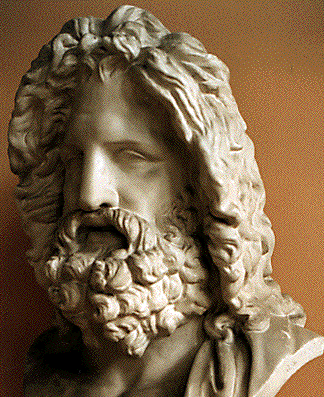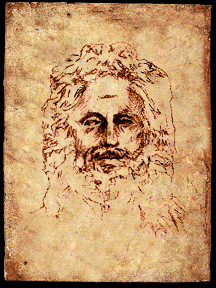|
It is estimated that he had 115
mistresses and 140
children (as
best as experts can guess). But, it is important to note that his
infidelities might actually be caused by his absorbtion of lesser
divinities
as his worship spread.
Many
of his lovers were mortal, nevertheless. There was
rumours
of a homosexual relationship with the beautiful Trojan youth, Ganymede (Gan-ih-mee-dee) or Ganymedes (Gan-ih-mee-deez).
In some accounts Ganymede was made the king of the winds and was then
known
as Aeolus (Ee-oh-luhs) who mysteriously
fathered
the four winds [Eurus (Yoo-ruhs), prince
of
the East winds; Notus or Auster (Noh-tuhs/Oh-stihr),
prince of the South winds; Zephyr/Zephyrus/Favonius (Zeh-fuhr/Zeh-fuhr-uhs/Fah-voh-nee-uhs),
prince of the West winds; and last but not least Boreas/Aquilo/Aquilos (Boh-ree-uhs/Ah-kwee-loh/Ah-kwee-lohs),
prince
of the North winds and harshest of the quartet] from his cave where all
winds are chained. Either way, Ganymede was believed to be the
most
beautiful of mortal men and was carried to Mount Olympus by Zeus'
eagle,
his sacred bird, to be cup-bearer for the mighty king of the
gods.
Oddly enough some myths suggest that he was to replace Zeus or Hera' s
female cup-bearer curiously named Ganymeda (Gan-ih-mee-dah)
or Hebe (Hee-bee). Some believe
that
Ganymede was emasculated in myths to save the philosophical Hellenics
of
later years the embarrassment. It may also seem that the two are
separate entities as Ganymeda later marries Herakles, but, the
similarities
of the name is curious nevertheless. In some accounts, Hera was
so
furious that Zeus would replace her cup-bearer the the boy had to be
renamed
Aeolus, deified and relocated to protect him from Hera's wrath, typical
of her jealous episodes.
Mythology is riddled with the tales
of Zeus' infidelities and
Hera's
wrathful anger and vengeance. The most notable and well known are those
pertaining to his son by Semele (Sehm-ah-lee),
Heracles (Her-uh-kleez;
Hee-rah-kleez;
Hayr-uh-kleez).
While Zeus was quick to break his own marriage vows the Iliad tells us
he "never helps liars or those who break their oaths." He was
also
depicted as bearing the scales of justice and was noted for his
wisdom.
These two contradicting images of him existed side by side for an
extremely
long time. Zeus' festival was the Olympia which became today's
Olympics.
His temples were existent throughout Greece, particularly Athens (Ath-ihnz).
The Athenian sanctuary was began by Pisastratus (Pihs-ah-stray-ruhs)
and compleated by Hadrian (Hay-dree-ahn). The major temple of
every
Greek city was that of Zeus. Probably the most notable, however,
is that of Dodona (Doh-dahn-ah).
Dodona
was built by the Greek Noah, Deucalion (Doo-kahl-ee-ahn)
after Zeus'
deluge, in Epiris (Ehp-ih-rihs).
It was the sight of his famous oracles who listened to the voice of the
wind as it rustled through the leaves of the mighty oak, Zeus' sacred
tree.
Their divinitory skills were supposedly excellent and unrivaled until
the
Oracles of Delphi (Dehl-fee; SEE APOLLO).
The oracles of Dodona are likely the oldest known in recorded
history.
Zeus
had many other names as well. He was also known as
Mechaneus (Mehk-ah-noos), manager and
contriver; the
name he shared with Apollo
(Ap-ah-loh),
Moeragetes (Mee-rah-juh-teez) as the
leader
and guide of the Fates; in Epeiros (Ee-pih-rohs)
he was called Molossus (Moh-lah-suhs)
which
is conspicuously similar to Apollo's
Colossus (Coh-lah-suhs);
as the rain god, he was called Pluvius (Ploo-vee-uhs);
and as the god of boundaries, landmarks and limitations he was
Terminalis (Tuhr-min-ah-lihs). He
was
known to the
Aegyptians and was honored as Zeus-Ammon or the ram-horned Zeus.
The Romans called him Jove (Johv) which
became
used as as an expression of astonishment or of personal oath,
Dispater (Dihs-pay-tuhr), Jupiter (Joo-piht-uhr)
for whom the planet was named and Viktor (Vihk-tohr)
which was also applied to Hercules (Her-kyoo-leez)
and Mars (Mahrz) to name a few.
Dyaus,
Indo-European; Dianus (Dih-ahn-uhs; Digh-an-us),
Janicot (Jan-ih-koh) and Janus (Jan-uhs)
may also be associated with him. He also bore many titles
including:
Soter (Soh-tehr), meaning saviour;
Kosmokrater
or Kosmokrates (Kahz-moh-kray-tuhr or
Kahz-moh-kray-teez),
ruler of the cosmos and Olympian Zeus, as chief of the Olympians.
He
has been a notable figure in the arts, of course.
Popular amongst
artists, poets, sculptors and the like. Sculptures, reliefs and
other
carvings are likely the most abundant medium which has been applied to
him. He is featured in Homer's Iliad and Hesiod's Theogeny.
The following associations have been applied to him esotericly:
|




